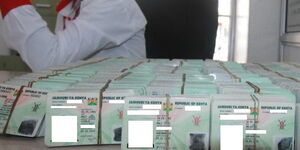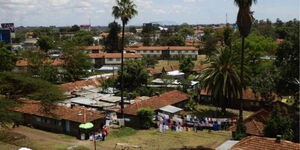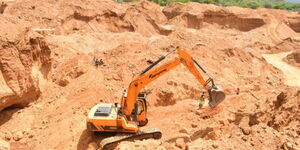Kenya's supposedly dying manufacturing sector was heralded by many as having risen from its ashes in the wake of the coronavirus pandemic that has bedevilled the country.
Followers of this belief have pointed to the factories that have risen up to the challenge to provide essential commodities during the pandemic.
They have used several examples to justify the apparent rise of Kenyan local industries.
The most clear-cut illustration of the unexplored potential of Kenya's industries was highlighted on Saturday, April 12 where 16 Kenyatta University students built a prototype for a ventilator in the country.
Or yet another example is the Kenya Medical Research Institute (KEMRI) which was lauded for innovating the Rapid Covid-19 Testing Kits.
These would see the research body able to test 35,000 in a day from a paltry 600 that was possible prior.
Optimistic Kenyans would also be quick to point to Kitui County Textile Centre (Kicotec) whose overnight switch to producing surgical masks was even praised by international media.
The factory which had previously concentrated on producing gardening clothes, uniforms, mats and napkins now produces 30,000 masks a day at the quality and standard of the N95.
The illustration of Kenya's ingenuity does not end there. One would be at fault for failing to mention the spray sanitiser systems that were engineered by the Technical University of Mombasa (TUM).
Most of the items being engineered in the country are in high demand in the nation itself and elsewhere.
It is Kenya's ability to produce these commodities that has pushed some to sing praises on the newfound efficiency of Kenya's manufacturing industry and to assert that its previous failures were orchestrated by political blunders.
But is this stance factual?
Kenyans.co.ke spoke to veteran economist David Ndii who was quick to correct these assertions.
"That is not industry, that is a war economy. During war, countries do things that they were not doing before because of the genesis of war. That is when all types of industries come up," explained Ndii.
"But that's because you are not sparing any cost, you can do it at whatever cost. This is not the case in a normal economy," he added.
The revered economist stated that the leaps in the industry could not be counted as evidence of growth as they took place in the suspension of normalcy.
"In a normal economy, the question is: are you competitive at doing something? So you cannot use what we can call the equivalent of war production to say that the economy has the capacity to do this," he asserted.
Ndii explained that the rules of an emergency situation allowed certain things to function that would not be feasible in normal times.
"If you are a car manufacturer, you can be commandeered to produce tanks. That does not mean that you have the capacity to manufacture trucks, you may be actually be producing very bad ones," Ndii stated.
The economist concluded that it would be false to say the economy had grown or that local industries were flourishing. It was more accurate to concede that the conditions of production allowed the current innovation.
"Now we are producing at whatever cost. We have commandeered resources to do things that are probably very inefficient and at a very high cost. This is exactly what an economy is not supposed to do," he stated.
Going by Ndii's arguments, it is more likely than not that the rise of local industries will see its reversal once the pandemic is behind us.












